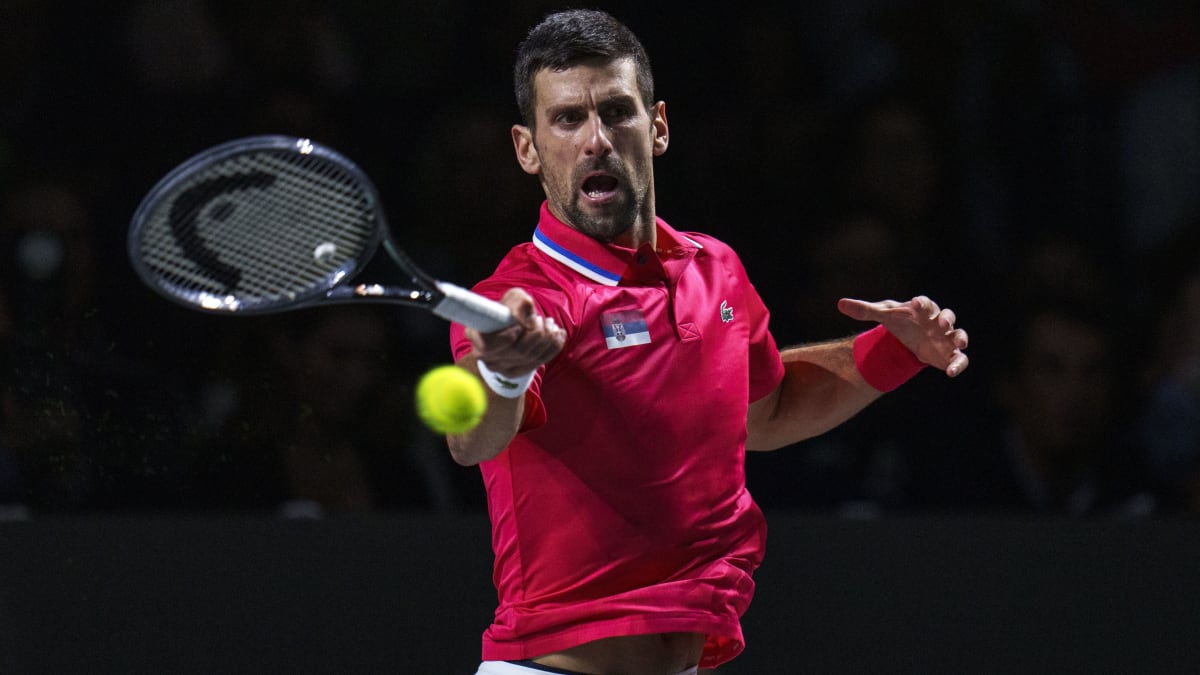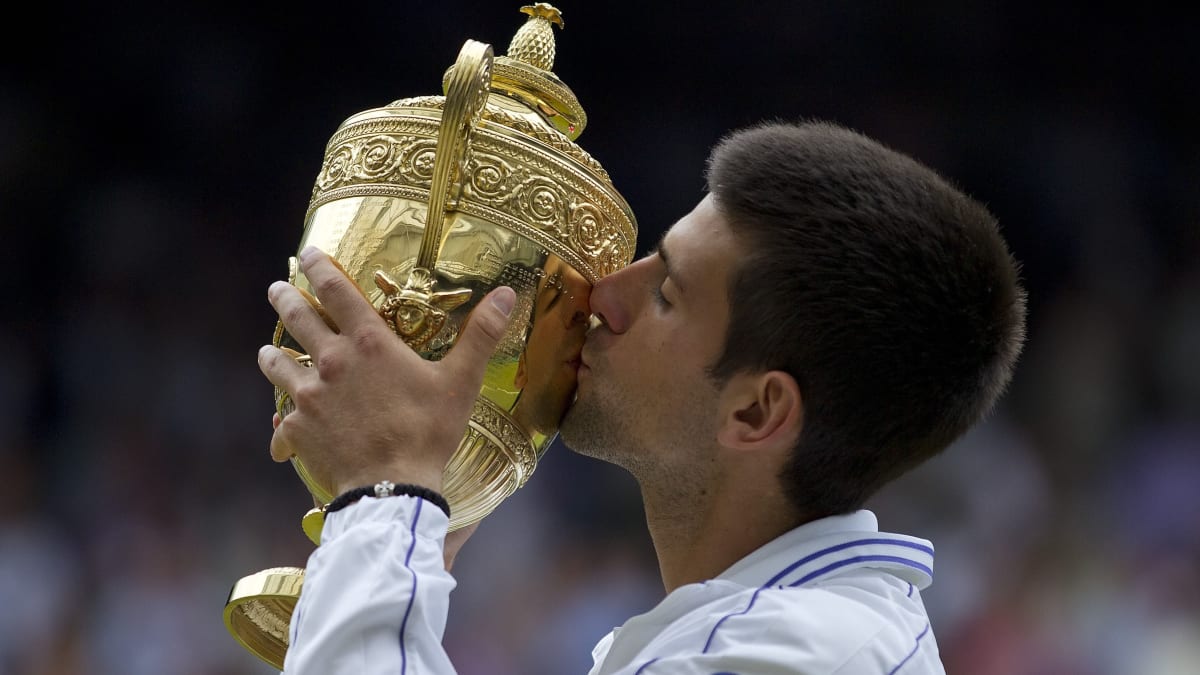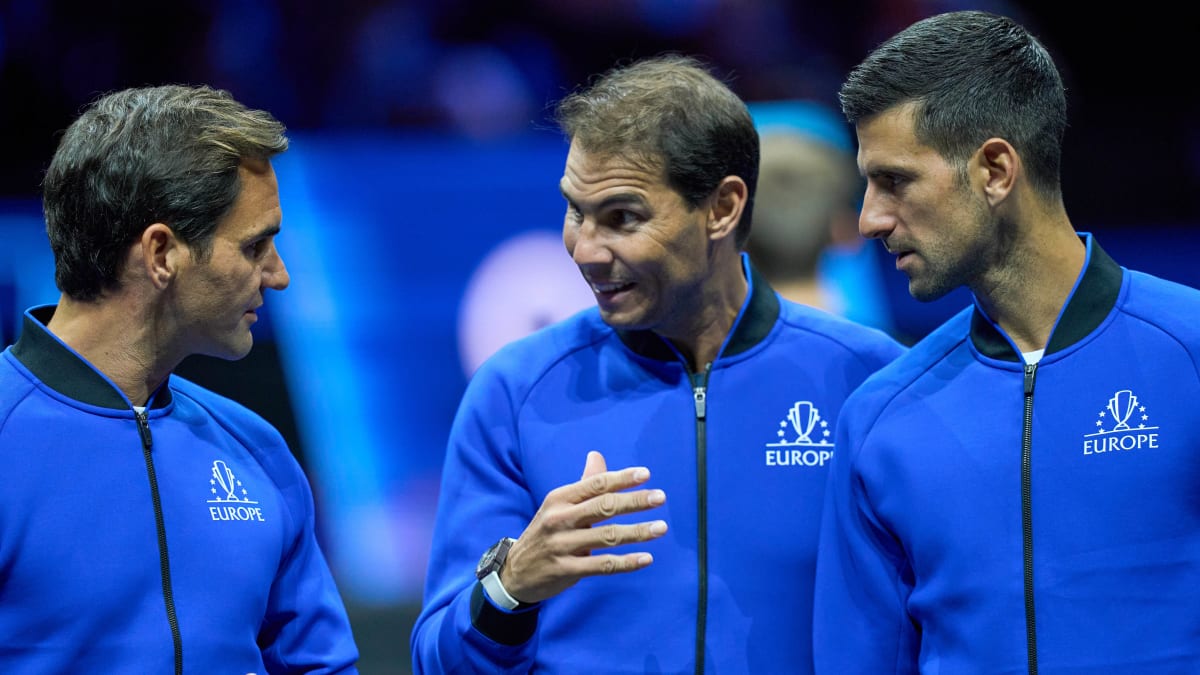Like any outdoor market that runs through an urban downtown, there is inevitably a T-shirt vendor. And at the entrance to Kalemegdan Park, at the base of a pedestrian promenade in Belgrade, the T-shirt guy offers two main choices. One is a shirt adorned with an image of Novak Djokovic, face contorted in intensity, as he is, no doubt, about to win one tennis title or another. The other option features Nikola … no, not Jokić, but Tesla, the Serbian American father of modern electricity, best known for pioneering alternating current in the late 1800s.
Such is the status conferred on Djokovic in his homeland.
Yet at least in the tennis sector, Djokovic isn’t just a generational figure; he’s a transformational one, who, not unlike Tesla—also tall, lanky and sometimes overshadowed by a rival—is a technician and a futurist, constantly pushing the parameters of possibility. In his 36th year, Djokovic turned in perhaps the most successful season of his career. Which is saying something.
For the fourth time, he won three of the four majors—and in so doing, vaulted past Rafael Nadal to become the all-time men’s leader in majors won, now up to 24 (and counting). And for the eighth time, Djokovic finished the year with the No.1 ranking. Instead of fending off his peers and longtime rivals (Nadal and Roger Federer), Djokovic picked on a younger cohort, beating back new challengers, often closer in age to his son, than to Djokovic himself.

Manu Fernandez/AP
Djokovic stands alone in more ways than one. Beyond tennis excellence, he is perhaps best known for a diet that makes Tom Brady look like a Guy Fieri disciple. Gluten? No. Meat? No. Sea algae smoothies? Yes. Alcohol? No, save the occasional sip of Italian wine. (“French is a bit too strong.”) An indulgence—say, after winning the Australian Open for the tenth time as he did earlier this year—comes in the form of a square of chocolate. Dairy-free. No refined sugar.
But Djokovic’s singularity goes far beyond that. Name another world-class athlete who vacations at a Greek monastery. Or commits to daily journaling. Or who takes a stance against video games, on the grounds that they’re unhealthy for children. And, of course, there is his refusal to submit to the COVID-19 vaccine. For all the comparisons to Aaron Rodgers, they fall short. There is a remarkable lack of certitude in Djokovic. When he says “I’m asking questions,” he means it. He wants to listen to you. He does care what you think. And don’t call him an anti-vaxxer. “I’m pro-freedom to choose.”
In November, 60 Minutes visited with Djokovic in Belgrade for this piece. He left the next day for the ATP Finals in Turin, Italy, where he consecrated his season by winning yet again. But for two hours, he starred in spirited, wide-ranging, no-topic-ducked conversation.
Some outtakes, edited lightly for brevity and clarity.
Jon Wertheim: Crazy as it sounds, at age 36, are you in your prime?
Novak Djokovic: I could say, yes. I was fortunate to have several primes during my career. 2011 was the first best year where I had a run of over 40 matches won without any loss. The first loss came, I don’t know, after 10 tournaments, midseason. That was the first time I won three [Grand] Slams in a year. And I had several years where I won three Slams in a year: 2015, 2016. I had maybe 18 or 19 finals in a row. So those were the primes in my 20s. And now in my 30s, I’ve been experiencing some really good years, particularly ’21 and this year, ’23.
JW: There’s a country music lyric, “Don’t let the old man in.” How are you keeping the old man away?
ND: I think it’s mindset, really. Age is just a number. It’s a cliché, but it really is a psychological approach that you have to life, to age, to career and to anything. Fundamentally, I put a lot of effort into having a proper routine to prevent injuries and absence from the tour. I don’t see any limit in terms of age. I’ve surpassed 35, now I have to be thinking about myself as an old guy? I actually don’t think that way.
JW: How does 36-year-old Novak do against that 24-year-old Novak?
ND: I think the 36 would win. Would be a tight match.
JW: You think so?
ND: I think mentally, I’m stronger now than I was 10 years ago. I think I was slightly faster 10 years ago. But I think I’m probably able to play smarter today. And I’m also able to cope with the pressure moments better than I did 10 years ago.
JW: What would you have wanted that 24-year-old to have known?
ND: More patience … which is also expected. You know, when you’re young, impatient. You want everything here and now without any delay. So, I think patience would be the biggest advice. And just trusting the process.

Susan Mullane/USA TODAY Sports
JW: What’s your indulgence? You win a big major tournament. What’s your big indulgence? What do you allow yourself to eat and drink?
ND: I love chocolate, you know. But I try to not have the chocolate that is made with cow’s milk and refined sugar. I try to have the kind of healthy alternative chocolate, so to say. But I just love it.
JW: How much of this is in service of your tennis, and how much of this is discipline and mental strength and ritual and routine?
ND: It’s lifestyle, really. It’s my choice. That’s how I wanna eat. That’s how I wanna live. A healthy lifestyle in general. Get a good amount of sleep, recovery; go outdoors, be in nature. Eat well, drink, hydrate. Hydration is super important. Exercise, movement, activity. So we try to have this kind of a holistic, healthy approach.
JW: A few years ago, we talked about writing. And you were journaling. You still have a pen in your hand?
ND: Yeah. Yeah. I do. I do. I combine it with typing on my computer, on my phone. But I try to write on the paper with a pen as much as I can because there’s something about it, that ritual where you’re emotionally cleansing. Spending some quality time with yourself, with your thoughts, I think it serves you well.
JW: Take us in [your head].
ND: Yeah. I’m sure that every athlete on a high level can relate. You know, you have your doubts and fears. And whoever says, “I have no fear,” he’s lying. I feel it every single match. What is important is to understand how you can acknowledge and accept what is happening inside of you, and not let that carry you too much astray, too much in the wrong direction.
I think conscious breathing helps a lot with that. So it’s normal to experience doubts and fears. It’s normal to be negative, to be stressed, to be pessimistic in your head. I don’t like this kind of a mindset that I see a lot in sports. Like, Just think positive thoughts. Be optimistic. There is no room for failure. There is no room for doubts, stuff like this. It’s impossible to do that.
JW: I could see people saying, “Novak’s had 24 majors.” What do you have to fear?
ND: I fear to lose a match. I fear to maybe let myself down. I fear to let my coach down. I fear I doubt that I can deliver the game that everyone expects me to deliver, right? And there are fans that came, maybe the first and only time they’re gonna watch you. So it’s a lot of expectations and pressure you have to deal with when you’re walking out on the court as one of the best players in the world. They all expect the highest and best of you.
JW: You once said to me you wanted to thank [Federer and Nadal]. What specifically did you wanna thank them for?
ND: The rivalries that I had with them and the matches that I had with them have really helped shape me into the player I am. It has given me the ability to understand what my flaws are, what my disadvantages are compared to them when I match up with them.
JW: What do I have to work on in order to beat these guys?
ND: Yes. I lost so many matches against them in early stages of my professional career. In the big, big stages—Grand Slams, more or less—I was always losing against these guys. I won my first Slam in 2008 in Australia. And then the next one was three years later. So in these three years, I was number three in the world. But, you know, I was in semis or finals of Slams, but I could never break that ice. And I could never make that extra step.
JW: Why?
ND: Because they were so good in their craft, and because they were so mentally strong and so consistent. They forced me to really rise on that level.
JW: You knew what the threshold, you knew what the bar was?
ND: The bar was extremely high. So hopefully I set that bar even higher for the younger guys.
JW: What is a greater source of pleasure and achievement for you, winning a major—you get a trophy, you get a check—or winning this GOAT debate?
ND: I don't know if I’ll ever win the GOAT debate because there’s obviously different definitions and opinions and comparing the eras. Whether you take only numbers or stats, it’s very difficult to compare obviously an era where you play with a wooden racket and nowadays. And where they couldn’t travel by plane before so much, and we can travel anywhere today and play more tournaments. So it’s all very relative. But, for me to try to get the most out of my last years of my professional career.
JW: You don’t wanna answer that question?
ND: The GOAT question? [Laughs.]
JW: All right. [Laughs.] You don’t like these GOAT questions.
ND: No, I mean—
JW: Fans love it.
ND: I know fans love it. And I think it’s great that there is a big discussion on that because, ultimately, all of us in tennis want more attention. We want more people, more younger generations to come in and get interested in watching tennis, debating about who is the greatest, who has the most titles, or comparing eras and stuff like this.

Peter van den Berg/USA TODAY Sports
JW: Chris Evert and Martina Navratilova. Great rivalry, but sometimes they weren’t even speaking to each other. And now, they’re great friends. With a little bit of detachment, 10 years, 20 years, do you see you and Rafa and Roger all having dinner?
ND: I would like to. I would really like to. I mean, obviously, we didn’t get along so well throughout our careers, off the court. And we are not friends because, you know, we’re rivals, and it’s difficult as competitors to be very close and kind of share and give insights to your life or to how you feel because it could be used against you. But we have shared the stage for so many years. And I think the greatest respect is always there, at least from my side, towards them. There’s always a huge amount of respect off the court because they have really defined me as the player that I am today. And all my success is also greatly owed to them and to the rivalries that we had. So yeah, I hope that one day when the curtains are slightly more closed, that we are able to sit down and reflect. It would be amazing.
JW: Help people understand this about tennis. There’s not much coaching involved. And—you’re not the only one, but you’re a notable one—players absolutely unload sometimes on their coaching—
ND: On my box?
JW: Right. What’s that all about?
ND: Yeah, there’s a lot that it is about.
JW: Explain.
ND: Sometimes it’s my frustration, maybe not particularly with the box, but just with myself, with my game. And then the player box and my coaching staff is normally 99% of the time the people that I look towards, you know? And I try to make an eye contact, try to communicate with them. So, they [laughs] unfortunately sometimes have to, you know, I guess accept some of my tantrums [laughs] that are happening on the court, even though it’s not their fault.
JW: Do you have people in your camp for both big decisions and small, that can say no to you? That can say, “Novak, no. Novak, bad idea. Novak, don’t do it”?
ND: I do. I do. Sometimes they do tell me that. But, sometimes they’ll let me in a way—how can I express myself?—that I must hit the rock bottom myself, or hit the wall with my head [laughs] before I realize it. So sometimes it’s necessary that you go through the process, you understand things yourself, the mistakes that you’ve done, and try to correct them and rectify them.
JW: But you have people that can say, “I know you’re the boss. I know you’re paying my bills, but no, Novak”?
ND: Yeah. Of course. And I think it’s important at the end of the day because if there is no honesty and transparency and communication, it’s going to be very difficult for us to get the most out of this relationship.
JW: For most athletes, their careers wind down. That doesn’t seem to be happening with you. When, when will you know it’s time?
ND: That’s a very good question that I don’t have an answer to. Maybe the moment will become closer once I start not to win the Grand Slams and not to be able to be one of the main contenders for major titles. And once the young guys start kicking my butt, then I’ll probably, you know, start to rethink and question whether I should keep going. But for now, it’s all good.







